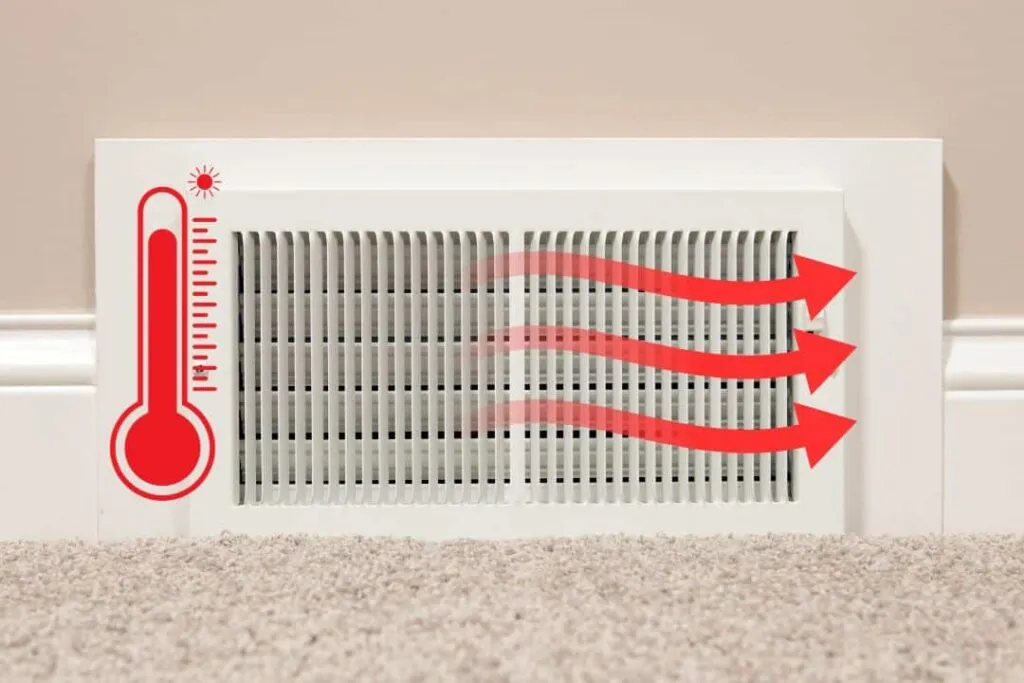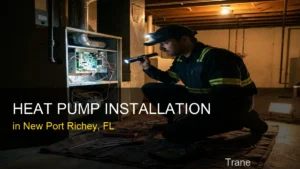Few things are more frustrating than finally getting your home or office to a comfortable temperature, only to have your AC start blowing hot air. If your worried about troubleshooting the issue, there’s no need to panic; as long as it’s blowing air, even if it’s warm, there’s a good chance that it is a minor technical problem that won’t break the bank. Let’s explore some common reasons why your AC might switch to warm air and what you can do to address the problem.
Troubleshooting On Your Own
The most frequent culprits for AC troubles often arise from neglecting regular maintenance before the start of the warm season, running the system at full throttle, or simple human error. Investing in preseason servicing can keep your AC operating efficiently and enable technicians to detect potential problems before they become costly issues. Running your air conditioner at full blast can lead to various problems. This not only strains your components and system but also accelerates wear and tear, potentially requiring a premature replacement.
Preventing Your Air Conditioner From Freezing
People often push their AC units to the limit for two primary reasons: extreme outside temperatures or shutting the unit off when not at home and then cranking it up upon return. Both scenarios can push the AC to work too hard, causing the evaporator coil’s temperature to drop below 32ºF. This leads to the formation of ice on the unit’s components instead of the water droplets evaporating as they should. If ice accumulates in your air conditioner, it obstructs airflow, preventing proper cooling. Maintaining a consistent temperature setting and avoiding frequent on-off cycles allows your AC to run evenly, maintaining a comfortable, steady indoor temperature. For warmer climates, experts recommend setting it between 76º and 78ºF.
Accidentally Running The Heat?
Common homeowner oversights can also lead to troubleshooting AC problems. Sometimes, someone may accidentally set the thermostat to warm instead of cool, or you may forget to switch it back after winter. Avoid this issue by presetting the temperature to a moderate level and selecting the “auto” mode, so your AC starts when the desired temperature is reached. Occasionally, the problem is as simple as a clogged air filter or a tripped breaker on the outside unit.
Checking All Breakers
Resetting a tripped breaker is straightforward, but if it becomes a recurring issue, it’s advisable to have a repair technician inspect your system to rule out any underlying electrical problems. For any home system that relies on proper airflow, such as your refrigerator, dryer, or heat pump, changing the air filter is crucial. Even in a minimally dusty environment, neglecting the filter can lead to internal freezing issues and hot air being blown into your space. During the summer, aim to change the filter monthly, and every six weeks in the winter, if you have a combination heating and cooling system.
When You Need To Call An Expert
If, after troubleshooting and checking the temperature, breakers, and air filter, your AC system is still not operating correctly, the issue may be related to:
- A refrigerant leak: This can disrupt your AC’s cooling process, causing it to blow warm air.
- A malfunctioning compressor: The compressor is essential for cooling, and if it fails, your AC won’t function properly.
- Faulty wiring or improper installation (if the unit is new): In the case of a new AC unit, installation problems or electrical issues may be the root cause.
Unless your AC system is old or poorly maintained, these problems are often due to overheating from heavy usage. The typical lifespan of a heat pump or central AC unit is between 12 and 15 years, while individual parts can last up to a decade with regular maintenance and proper use. If your unit is new, it should still be under warranty from the HVAC company that installed it, with parts typically guaranteed against defects for up to two years from the purchase date. It’s crucial to keep your warranty and receipts in a secure place after installing a new AC. If the issue is not covered by the manufacturer or installation company, you should consult a professional HVAC technician. Don’t suffer in the heat unnecessarily. When your AC starts blowing warm air, begin by investigating the simplest solutions. If checking breakers or changing the air filter doesn’t resolve the issue, it’s time to contact a professional AC contractor promptly. Unless your unit is old or damaged, most problems can be resolved quickly, allowing you to enjoy a cool and comfortable indoor environment once again.
Contact An Expert At Velocity Air Conditioning
If you’re experiencing issues with your air conditioner, don’t hesitate to contact Velocity Air Conditioning for professional and reliable AC repair services. We’ll get your cooling system back on track so you can enjoy a comfortable indoor environment. Why is my AC Blowing Warm Air After Running For Awhile? Let us help you find the answer!

